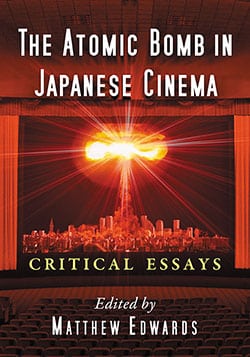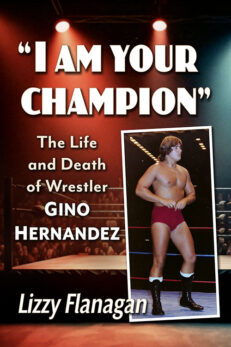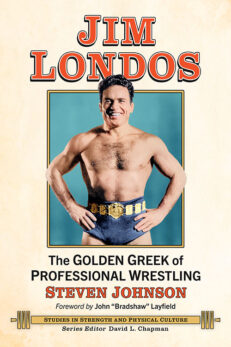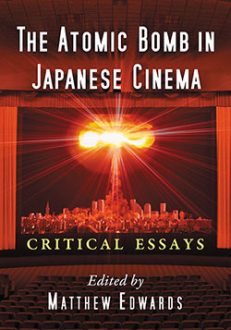The Atomic Bomb in Japanese Cinema
Critical Essays
$39.95
In stock
About the Book
Seventy years after the nuclear attacks on Hiroshima and Nagasaki, Japan is still dealing with the effects of the bombings on the national psyche. From the Occupation Period to the present, Japanese cinema had offered a means of coming to terms with one of the most controversial events of the 20th century. From the monster movies Gojira (1954) and Mothra (1961) to experimental works like Go Shibata’s NN-891102 (1999), atomic bomb imagery features in all genres of Japanese film. This collection of new essays explores the cultural aftermath of the bombings and its expression in Japanese cinema. The contributors take on a number of complex issues, including the suffering of the survivors (hibakusha), the fear of future holocausts and the danger of nuclear warfare. Exclusive interviews with Go Shibata and critically acclaimed directors Roger Spottiswoode (Hiroshima) and Steven Okazaki (White Light/Black Rain) are included.
About the Author(s)
Bibliographic Details
Edited by Matthew Edwards
Format: softcover (7 x 10)
Pages: 300
Bibliographic Info: appendix, notes, bibliographies, index
Copyright Date: 2015
pISBN: 978-0-7864-7912-2
eISBN: 978-1-4766-2020-6
Imprint: McFarland
Table of Contents
Acknowledgments vi
Preface • Matthew Edwards 1
Introduction • Matthew Edwards 5
Prologue: Hiroshima/Nagasaki • Matthew Edwards 11
Part I: Gojira and the Bomb
The Rhetorical Significance of Gojira: Equipment for Living Through Trauma • Shannon Stevens 17
Japan Removed: Godzilla Adaptations and Erasure of the Politics of Nuclear Experience • Jason C. Jones 34
Atomic Reaction: Godzilla as Metaphor for Generational Attitudes toward the United States and the Bomb • John Vohlidka 56
Part II: Japanese Atomic Cinema, 1945–2014
Suppression and Censorship: Japanese Cinema During the Occupation • Matthew Edwards 69
Pica-don: Japanese and American Reception and Promotion of Hideo Sekigawa’s Hiroshima • Mick Broderick and Junko Hatori 77
The Shadow of the Bomb in Hiroshi Teshigahara’s The Face of Another • Tony Pritchard 88
Nuclear Skin: Hiroshima and the Critique of Embodiment in Affairs Within Walls • Julia Alekseyeva 99
The Atomic Bomb Experience and the Japanese Family in Keiji Nakazawa’s Anime Hadashi no Gen (Barefoot Gen) • Kenji Kaneko 111
Yuichi and Jizō in Black Rain: Imamura’s Phenomenological Attempt to Render a Hiroshima Wormhole Experience Among His Audience • Keiko Takioto Miller 124
Trauma and Witness in Hideo Nakata’s Ring • Tienfong Ho 140
The Fragile Roots of Memory • Robert McParland 150
Inconceivable Anxiety: Representation, Disease and Discrimination in Atomic-Bomb Films • Yuki Miyamoto 157
Kazuo Kuroki and Hisashi Inoue’s Chichi to kuraseba: Remember, Protest and Return to Ordinary Life • Yoshiko Fukushima 171
Breaking the Silence of the Atomic Bomb Survivors in the Japanese Graphic Novel Town of Evening Calm, Country of Cherry Blossoms and the Film Adaptation • Senjo Nakai 184
The Sound of the Bomb: Gō Shibata’s NN-891102 • Johannes Schönherr 200
Part III: Western Perspectives
Hiroshima Films: Cultural Contexts Before, During and After the Cold War • Greg Nielsen and Margaret M. Ferrara 211
Hiroshima: An Interview with Director Roger Spottiswoode • Matthew Edwards 228
White Light/Black Rain: The “Atomic Films” of Steven Okazaki • Matthew Edwards 240
A[nime] Bomb: An Interview with Hibakusha Director Steve Nguyen • Matthew Edwards 246
Hibakusha: Our Life to Live: An Interview with Director David Rothauser • Matthew Edwards 254
All That Remains: An Interview with Ian and Dominic Higgins • Matthew Edwards 267
Appendix: Japanese Titles of Films Referenced in Text 281
About the Contributors 283
Index 285
Book Reviews & Awards
- “A valuable contribution”—Steve Okazaki, Emmy award winning director
- “A fascinating and enlightening read”— Ian and Dominic Higgins, film directors
- “So incredibly honored to be a part of this wonderful collection of essays that explore the extensive collection of stories about the atomic bomb in popular cinema.”—Steve Nguyen, film director
- “A work of immense scholarship and devoted passion”—David Rothauser, director






